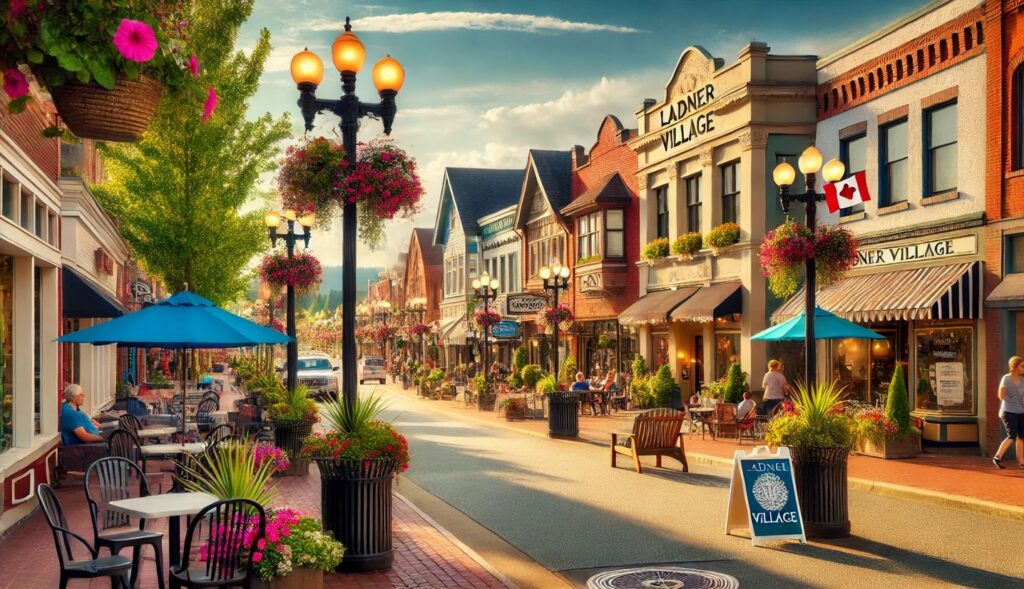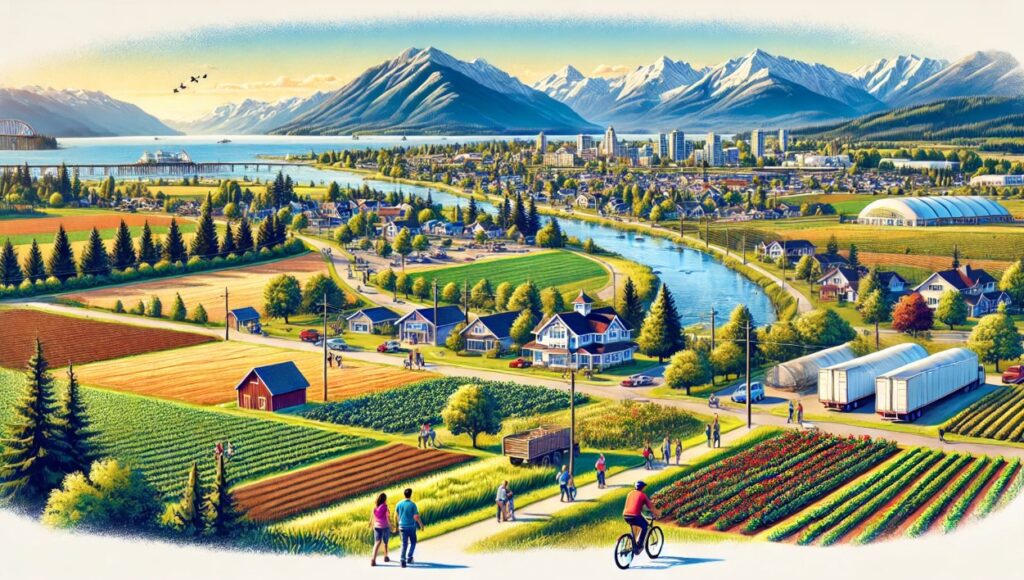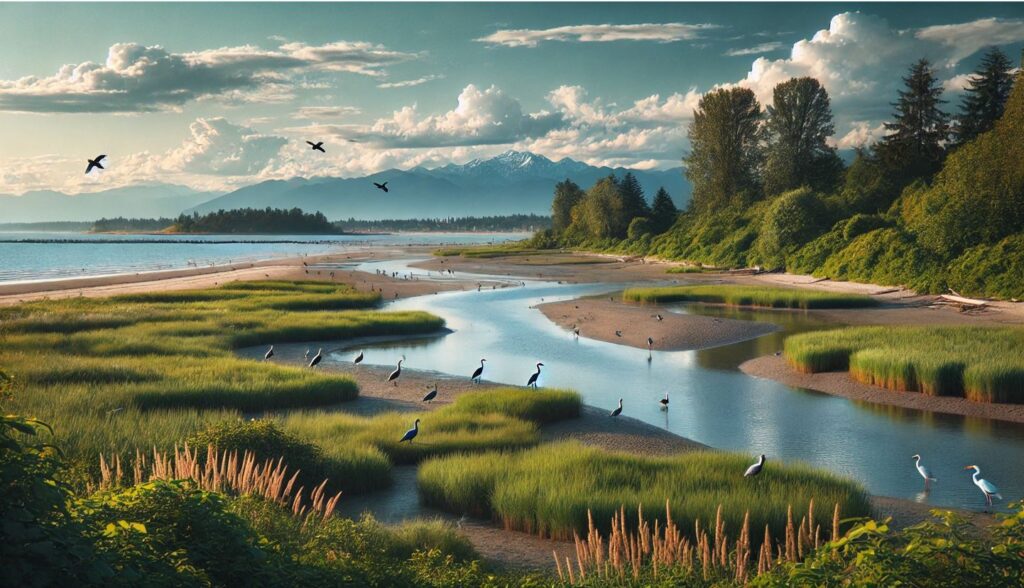Delta is made up of three distinct communities, each offering its own character and charm. North Delta, the largest and most populated area, is a primarily residential community surrounded by lush parks and green spaces, making it a popular choice for families. Its extensive trail systems, like those in Burns Bog, offer opportunities for walking, cycling, and exploring nature. Ladner, a historic fishing and farming village, is known for its small-town atmosphere, charming streets, and a strong connection to Delta’s agricultural roots. Visitors and locals alike enjoy Ladner Village’s farmers’ markets, boutique shops, and friendly community vibe. Tsawwassen, situated along the coast, is famous for its sunny climate, sandy beaches, and proximity to Boundary Bay. It’s a hotspot for outdoor activities like kiteboarding, paddleboarding, and birdwatching, while also being home to the massive Tsawwassen Mills Shopping Centre.

Economically, Delta thrives as a hub for agriculture, transportation, and trade, with the Roberts Bank Superport playing a significant role in the region’s logistics and export industries. The city also focuses heavily on sustainability and environmental conservation, with numerous parks, wildlife sanctuaries, and green initiatives that reflect its commitment to protecting its natural beauty.
Delta’s family-friendly environment, recreational opportunities, and vibrant communities make it an ideal place to visit, live, and explore.
The history of Delta, British Columbia, stretches back thousands of years, as the area lies on the traditional, ancestral, and unceded territories of the Tsawwassen First Nation and other Coast Salish peoples. For centuries, Indigenous communities thrived in the fertile lands and rich waterways of the region. The nearby Fraser River, tidal marshes, and coastline provided abundant resources such as salmon, shellfish, game, and berries, supporting a sustainable lifestyle. The Tsawwassen people, whose name means “land facing the sea,” cultivated a deep connection to the land and waters that remains integral to their culture today.
By the late 1800s, Ladner Village had grown into a bustling center for farming and fishing, while Tsawwassen evolved into a residential and recreational area. Delta officially became a municipality in 1879, solidifying its role as a key agricultural and trade hub in the Lower Mainland.
The mid-19th century brought significant changes with the arrival of European settlers. Delta’s fertile soil and access to waterways made it an attractive location for farming, fishing, and trade. Early settlers began constructing dikes to reclaim land for agriculture, which became the foundation of Delta’s economy. By the 1860s, farming and fishing had firmly established themselves as the area’s primary industries, with salmon canneries popping up along the Fraser River. Ladner, one of Delta’s key communities, was named after Thomas and William Ladner, two English brothers who played a vital role in developing the local agricultural industry.
Throughout the 20th century, Delta continued to grow, balancing its agricultural roots with modern development. The construction of major transportation routes and the Roberts Bank Superport further boosted Delta’s importance in trade and industry. Today, Delta celebrates its history through its heritage sites, community events, and continued preservation of its agricultural and natural landscapes.
Boundary Bay Regional Park is a haven for outdoor lovers and one of Delta’s most popular natural attractions. Located on the shores of Boundary Bay, this park is renowned for its stunning coastal scenery, peaceful walking trails, and opportunities for wildlife viewing. The area is a critical stopover for migratory birds along the Pacific Flyway. It is a favorite destination for birdwatchers who can spot species such as bald eagles, snowy owls, and sandpipers. The park also features bike-friendly trails, picnic areas, and access to the sandy beaches of Centennial Beach. Whether you’re walking along the shoreline, cycling through serene pathways, or simply enjoying the view of Mount Baker in the distance, Boundary Bay is an ideal place to unwind and connect with nature.
If you’re looking for a mix of shopping and entertainment, Tsawwassen Mills is the place to go. As one of the largest shopping centers in British Columbia, Tsawwassen Mills features over 200 stores, including major brands, boutique retailers, and outlet shops. In addition to shopping, visitors can enjoy a variety of entertainment options, such as an arcade, indoor skate park, and dining options in its expansive food court. The mall’s modern design incorporates artwork inspired by local First Nations culture, adding an educational and cultural touch to the shopping experience. Whether you’re indulging in retail therapy, grabbing a bite to eat, or spending quality time with family, Tsawwassen Mills has it all.
Ladner Village is the perfect destination for those looking to experience Delta’s small-town charm. This historic area in the heart of Ladner offers a delightful mix of boutique shops, cozy cafes, and local eateries. Known for its friendly community atmosphere, Ladner Village is a popular gathering spot for residents and visitors. One of its highlights is the Ladner Village Market, a seasonal farmers’ market where you can find fresh produce, artisan goods, handmade crafts, and live entertainment. The market celebrates Delta’s agricultural heritage and is an excellent way to support local businesses. After exploring the market, stroll through the historic streets or visit nearby nature trails to complete your day.
Situated on Westham Island, the George C. Reifel Migratory Bird Sanctuary is a treasure for wildlife lovers and a key destination for birdwatching in British Columbia. The sanctuary covers over 850 acres of wetlands, marshes, and natural habitats home to thousands of migratory birds, including snow geese, herons, ducks, and songbirds. Fall and winter are especially popular times to visit, as flocks of birds stop here during their migration journeys. The sanctuary offers walking trails, birdwatching towers, and educational programs, making it a great spot for both serious birdwatchers and casual visitors.
Delta’s central location in the Lower Mainland makes it an excellent home base for exploring some of British Columbia’s most vibrant and charming communities. Surrounded by stunning landscapes and accessible transportation routes, Delta is just a short drive from a variety of nearby towns and cities that offer unique attractions and experiences:
Richmond is a bustling city known for its multicultural vibe, outstanding dining scene, and vibrant shopping destinations. It’s home to the Vancouver International Airport (YVR), making it a gateway for international travellers. Richmond is renowned for its authentic Asian cuisine, particularly in the Golden Village area, where you’ll find some of Canada’s best dim sum, sushi, and bubble tea. Visitors can explore the Richmond Night Market, a seasonal event filled with food vendors, unique crafts, and live entertainment. Nature lovers can enjoy the Richmond Nature Park or take a stroll along the West Dyke Trail, which offers panoramic views of the coastal landscape.
Surrey, one of the fastest-growing cities in British Columbia, offers a dynamic mix of urban amenities and natural spaces. Known as the “City of Parks,” Surrey boasts over 200 parks, including the expansive Bear Creek Park, which features walking trails, gardens, and a miniature train. Surrey is also a cultural hub, hosting events such as the Surrey Fusion Festival, which celebrates music, food, and traditions worldwide. The city’s diverse neighborhoods, growing business sector, and proximity to Delta make it a popular destination for day trips and exploring.
As the heart of Metro Vancouver, the city of Vancouver is one of Canada’s most iconic destinations. Known for its stunning skyline, lush green spaces, and world-class attractions, Vancouver is a must-visit city just a short drive from Delta. Visitors can spend the day exploring Stanley Park, enjoying the shopping and dining in Gastown, or soaking up the vibrant energy of Granville Island. With its mix of urban sophistication and natural beauty, Vancouver offers something for everyone.
Located just south of Surrey, White Rock is a picturesque seaside community known for its charming waterfront and laid-back vibe. The city’s most famous landmark is the White Rock Pier, which stretches 470 meters into the Pacific Ocean and provides spectacular coastline views. White Rock Beach is a perfect spot for sunbathing, strolling along the promenade, or enjoying fresh seafood at one of the waterfront restaurants. This peaceful town is ideal for a relaxing escape and starkly contrasts the bustling energy of nearby urban centers.
Whether you’re looking for big-city excitement, serene coastal retreats, or diverse cultural experiences, Delta’s neighboring towns and cities have something to offer every visitor.
According to the 2021 Canadian census, Delta has approximately 108,455 residents. The city is celebrated for its diversity, with over 40% of its population identifying as immigrants. This cultural richness is reflected in the variety of languages spoken in Delta. English is the primary language, but Punjabi, Mandarin, and Tagalog are also widely spoken. This diversity contributes to the vibrant and welcoming atmosphere that makes Delta an inclusive place to live.

Here’s a quick look at some key stats about Delta:
Visitors are drawn to Delta’s unique mix of attractions, from historic Ladner Village to the breathtaking Boundary Bay Regional Park. Whether wandering through the seasonal Ladner Village Market, birdwatching at the George C. Reifel Migratory Bird Sanctuary, or enjoying a family picnic at Centennial Beach, Delta offers experiences combining relaxation and adventure.
For those considering a move to Delta, the city offers a wide range of amenities, from excellent schools and recreational facilities to a thriving economy and safe, welcoming neighbourhoods. Families will appreciate the city’s abundance of parks and green spaces, while professionals benefit from its proximity to Vancouver and key economic hubs like Richmond and Surrey.
